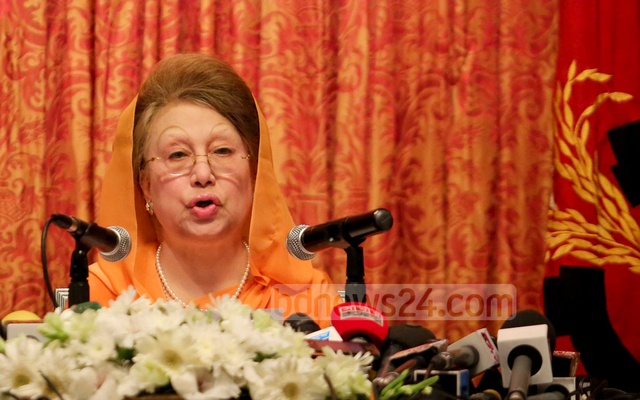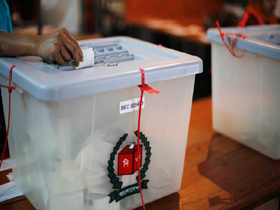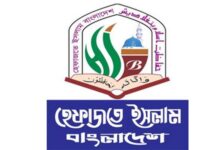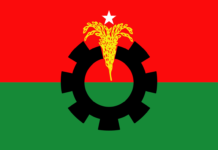Khaleda Zia has presented a 13-point proposal on the formation of the next Election Commission (EC) and how it will hold the next general election.
The BNP chairperson says the next commission will have to be formed on a consensus reached by every registered political party or those elected to Parliament ever since independence.
She also says some articles of the Representation of the People Order need to be amended to make guidelines on the constitution of the commission, determination of the eligibility of the commissioners, and guaranteeing all parties’ participation in the election.
She presented the proposals at a news conference in Dhaka Westin hotel on Friday ahead of the end of the tenure of current EC headed by Chief Election Commissioner Kazi Rakibuddin Ahmad.
The term of the current EC will end in February next year. The 11th parliamentary election, scheduled for 2019, will be held under the EC that follows.
Terming the current CEC as a puppet of the Awami League government, the BNP chief demanded that the 11th general election be held under the supervision of a ‘neutral, polls-time supporting government’.
The BNP, which has won two parliamentary elections since 1991, boycotted the 2014 general elections demanding the elections to be held under a caretaker administration. Khaleda, however, did not use the word ‘caretaker’ in her 45-minute speech.
The former prime minister said she would propose plans to form ‘this government when the time comes’.
She said the Election Commission’s ‘controversial and partisan’ role in the last two general elections and the local government elections in past few years have ‘shocked and dismayed’ the people.
“The people want a positive change. They want institution of a neutral and capable Election Commission that will firmly discharge its responsibilities with fairness and neutrality,” Khaleda said.
“They want a free, fair, credible and participatory election where they can exercise their constitutional right to franchise unhindered, so that, their verdict is not changed through any crafty or unfair means.”
The BNP has not taken part in most of the elections organised by the current EC, formed by then president Zillur Rahman through a search committee set up after talks with various political parties in 2012.
The party sat out the 2014 election, the run-up to which was marred by a deadly violent campaign for the demand of a caretaker government.
Following the boycott, 153 representatives were elected to Parliament of 300 seats without contest in the election which saw the Awami League return to power for a second straight term.
Khaleda’s proposals:
>> The president will sit with representatives of ‘all parties’ separately to determine the process and system of appointing the election commissioners.
>> There can be representatives of BNP-led 20-Party Alliance and Awami League-led Grand Alliance in the meetings.
>> The president may involve ‘honest, qualified and impartial’ representatives of the civil society as well.
>> The talks on the qualification, disqualification and nomination of the chief election commissioner and the election commissioners will have to continue until a ‘consensus’ is reached among ‘all parties’.
>> ‘Agreed Meeting Minutes’ and ‘Unanimous Decisions’ taken in the meetings, containing signatures of respective representatives of ‘all parties’, will have to be published.
>> The president will constitute a Search Committee consisting of five members. Each party will make specific written proposal for the appointment of the members of the Search Committee.
>> Each party will recommend two specific names and their details for each of the five election commissioners, including their chief. Out of the names proposed for the EC, the Search Committee will pick two for CEC’s post and eight for the posts of four election commissioners.
>> The president will constitute the new commission by choosing five from the list made by the Search Committee. The finally selected persons’ resume and wealth information will also be published.
Khaleda’s proposals also included some to strengthen the EC for free and fair elections. She proposed that partisan law-enforcing officers not be put on election duty and for demarcation of electoral areas.
Her other proposals included deployment of military during national elections.
“Without a neutral election-time government, co-operation of the key ministries mentioned above cannot be ensured and it is not possible to hold a free, fair and credible election,” she said concluding her speech.
Source: Bd news24










